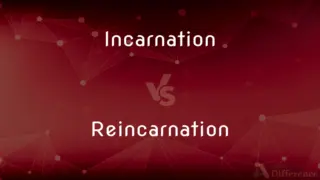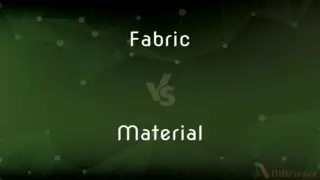Dusk vs. Gloaming — What's the Difference?
By Maham Liaqat & Urooj Arif — Updated on April 5, 2024
Dusk is the time of day after sunset, marked by diminishing light, while gloaming refers to twilight, a poetic term for evening twilight's dim light.

Difference Between Dusk and Gloaming
Table of Contents
ADVERTISEMENT
Key Differences
Dusk is recognized as the period following sunset when the sky gradually darkens, transitioning from daylight to evening. It is a term widely used in both everyday language and scientific contexts to denote the time of decreased light before nightfall. Gloaming, on the other hand, is a term steeped in poetic and literary tradition, often used to describe the same time of day with a focus on its ethereal, soft light. It evokes a sense of calm and beauty associated with the evening twilight.
While dusk is a more commonly used term and understood globally across cultures as the time of day when light fades into darkness, gloaming is less commonly used and may be considered more archaic or poetic. Gloaming holds a special place in literature and poetry, where it is often chosen for its romantic or melancholic connotations, whereas dusk is utilized for more general, everyday descriptions.
The scientific community tends to prefer terms like dusk, twilight, and civil twilight to describe the phases of diminishing light after sunset, based on specific degrees below the horizon. Gloaming, while it describes a similar time of day, is rarely used in scientific descriptions due to its subjective and variable interpretation. Dusk can be quantified more precisely, making it more suitable for scientific and navigational purposes.
Dusk marks the end of evening civil twilight, a time when outdoor activities can come to an end without the need for artificial light. This time is crucial for certain religious practices and in the calculation of various local and international laws regarding outdoor activities. Gloaming, evoking a sense of tranquility and reflection, is less about the precise time and more about the quality of light and the atmosphere it creates.
While both terms refer to the period of diminishing light following sunset, dusk is more commonly used in everyday language and scientific contexts for its clarity and universality. Gloaming, with its poetic and literary heritage, conveys a deeper, often emotional connection to the evening twilight, highlighting the interplay of light and shadow in a more romantic or melancholic context.
ADVERTISEMENT
Comparison Chart
Definition
The time of day immediately following sunset.
Poetic term for twilight, especially in the evening.
Usage
Common in everyday language and scientific contexts.
More poetic and literary, less common in everyday use.
Connotation
Marked by the end of daylight and onset of darkness.
Evokes tranquility, beauty, and sometimes melancholy.
Scientific Use
Precisely defined in terms of solar angles.
Rarely used due to its subjective nature.
Cultural Significance
Often associated with the end of activities and onset of nighttime routines.
Linked to romance, tranquility, and introspection.
Compare with Definitions
Dusk
Transition to Night.
Dusk is when nocturnal animals start their activities.
Gloaming
Symbol of Transition.
In poetry, the gloaming often symbolizes change or transition.
Dusk
End of Daylight.
We planned to return home before dusk to avoid the dark.
Gloaming
Ethereal Evening Light.
They took a stroll in the gloaming, enjoying the peace.
Dusk
Diminishing Light.
The park closes at dusk when visibility decreases.
Gloaming
Romantic Evening Atmosphere.
The gloaming is their favorite time for quiet conversations.
Dusk
Time for Evening Activities.
Evening prayers are often held at dusk.
Gloaming
Poetic Twilight.
The gloaming filled the sky with a soft, violet hue.
Dusk
Evening Twilight.
The city lights began to sparkle at dusk.
Gloaming
Literary Term for Dusk.
The novel described a mysterious figure appearing in the gloaming.
Dusk
Dusk occurs at the darkest stage of twilight, or at the very end of astronomical twilight after sunset and just before night. At predusk, during early to intermediate stages of twilight, enough light in the sky under clear conditions may occur to read outdoors without artificial illumination; however, at the end of civil twilight (when Earth rotates to a point at which the center of the Sun's disk is 6° below the local horizon), such lighting is required to read outside.
Gloaming
Twilight; dusk.
Dusk
The darker stage of twilight, especially in the evening.
Gloaming
Twilight, as at early morning (dawn) or (especially) early evening; dusk.
Dusk
Tending to darkness; dusky.
Gloaming
(obsolete) Sullenness; melancholy.
Dusk
To become or make dark or dusky.
Gloaming
Present participle of gloam
Dusk
A period of time at the end of day when the sun is below the horizon but before the full onset of night, especially the darker part of twilight.
Gloaming
Twilight; dusk; the fall of the evening.
Dusk
A darkish colour.
Gloaming
Sullenness; melancholy.
Dusk
The condition of being dusky; duskiness
Gloaming
The time of day immediately following sunset;
He loved the twilight
They finished before the fall of night
Dusk
(intransitive) To begin to lose light or whiteness; to grow dusk.
Dusk
(transitive) To make dusk.
Dusk
Tending to darkness or blackness; moderately dark or black; dusky.
Dusk
Tending to darkness or blackness; moderately dark or black; dusky.
A pathless desert, dusk with horrid shades.
Dusk
Imperfect obscurity; a middle degree between light and darkness; twilight; as, the dusk of the evening.
Dusk
A darkish color.
Whose duck set off the whiteness of the skin.
Dusk
To make dusk.
After the sun is up, that shadow which dusketh the light of the moon must needs be under the earth.
Dusk
To grow dusk.
Dusk
The time of day immediately following sunset;
He loved the twilight
They finished before the fall of night
Common Curiosities
Can gloaming be used in a scientific context?
Gloaming is rarely used scientifically due to its subjective nature; terms like dusk or twilight are preferred for precision.
How do cultures view dusk and gloaming?
Cultures may view dusk as a time of day for winding down activities, while gloaming might be seen through a more romantic or spiritual lens.
Why is gloaming considered poetic?
Gloaming evokes a sense of tranquility and beauty, often used in literature and poetry for its romantic and ethereal connotations.
Can gloaming and dusk occur at the same time?
Yes, they can describe the same time of day, but gloaming emphasizes the atmosphere and light quality.
Do animals react differently during dusk and gloaming?
Animals may become more active during this time, but the terms themselves don't affect animal behavior.
How long does dusk last?
The duration of dusk varies with geographic location and season but generally lasts from 20 to 30 minutes after sunset.
What is the difference between dusk and gloaming?
Dusk is the time following sunset marked by diminishing daylight, while gloaming is a poetic term for evening twilight, focusing on the quality of light.
Is dusk the same as twilight?
Dusk is part of the twilight period, specifically the time when daylight fades into night.
Is gloaming a good time for photography?
Yes, the unique light during gloaming is prized by photographers for its soft and diffuse qualities.
What literary works feature gloaming prominently?
Gloaming is featured in various poems and novels, often to set a mood or symbolize transition.
Do dusk and gloaming have the same impact on light pollution?
Both contribute to diminishing natural light, but the impact on light pollution depends on human activity and artificial lighting.
Are there any health benefits to experiencing dusk or gloaming?
Both can offer psychological benefits, such as relaxation and a sense of peace.
Is there a specific way to measure when gloaming occurs?
Unlike dusk, gloaming is more subjective and lacks a precise scientific measurement.
Can gloaming refer to morning twilight as well?
While traditionally associated with evening, gloaming can sometimes refer to morning twilight in a broader sense, though this usage is less common.
How do dusk and gloaming affect human behavior?
Dusk often signals the end of day's activities, while gloaming might inspire contemplation or romantic outings.
Share Your Discovery

Previous Comparison
Incarnation vs. Reincarnation
Next Comparison
Fabric vs. MaterialAuthor Spotlight
Written by
Maham LiaqatCo-written by
Urooj ArifUrooj is a skilled content writer at Ask Difference, known for her exceptional ability to simplify complex topics into engaging and informative content. With a passion for research and a flair for clear, concise writing, she consistently delivers articles that resonate with our diverse audience.











































